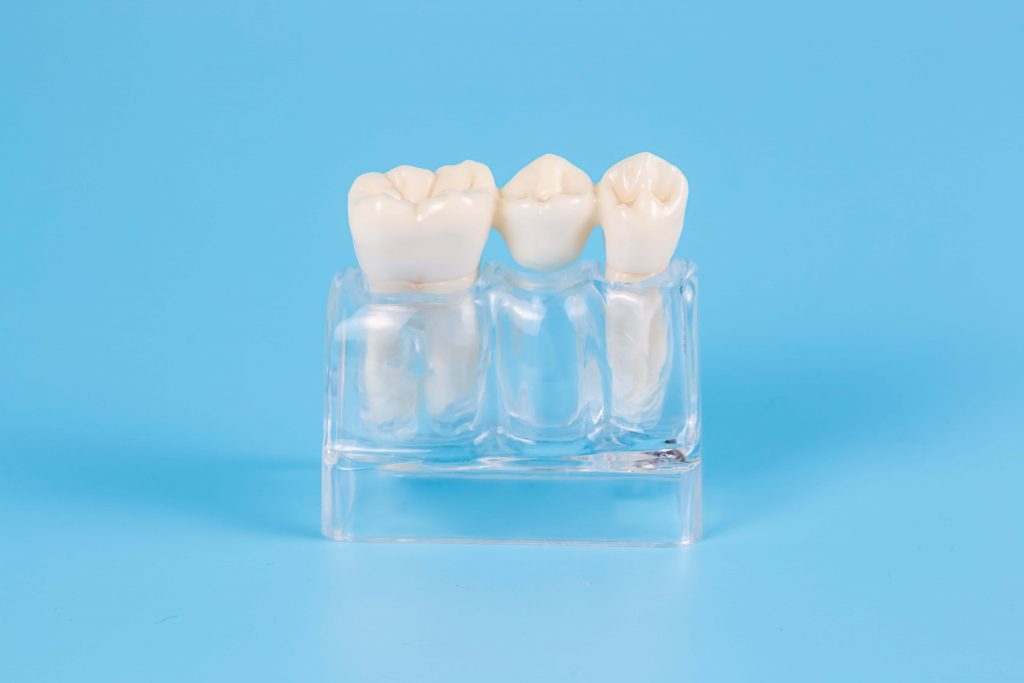When it comes to replacing missing teeth, the decision between Dental Implants vs. Dental Bridges is a common dilemma for many patients. Both options offer functional and aesthetic benefits, but choosing the right one depends on several factors, including your overall oral health, budget, and personal preferences. In this post, we’ll take a detailed look at both treatments, comparing their pros, cons, and suitability for different dental needs. Whether you’re dealing with a single missing tooth or multiple gaps, this guide will help you make an informed decision about which tooth replacement option is best for you.
What Are Dental Implants and Dental Bridges?
Before diving into a comparison, let’s first define what dental implants and dental bridges are, as well as how they work to restore missing teeth.
Dental Implants: How They Work
Dental implants are titanium posts surgically placed into the jawbone, acting as artificial tooth roots. After the implant integrates with the bone in a process called osseointegration, a crown is placed on top to replace the missing tooth. This procedure is considered one of the most advanced and reliable methods of tooth replacement due to its durability and natural look.
Implants provide a stable foundation for replacement teeth, and they also help preserve jawbone health, preventing bone loss that often occurs after a tooth is lost. Additionally, implants don’t require alteration of adjacent teeth, making them a more conservative solution when compared to other options.
Dental Bridges: Types and Mechanisms
A dental bridge is a prosthetic device used to fill the gap left by one or more missing teeth. It consists of two crowns on either side of the gap (the abutment teeth), with one or more artificial teeth (pontics) in between. The bridge is fixed in place, and these crowns are typically bonded to the natural teeth next to the gap, anchoring the bridge securely.
There are different types of dental bridges, including traditional fixed bridges, cantilever bridges, PFM bridges and Maryland bridges, each designed to address specific situations based on the number of missing teeth and the condition of surrounding teeth.
Key Differences in Design and Function
The main difference between dental implants and dental bridges lies in the design and the way they function. Implants are standalone solutions, meaning they don’t rely on surrounding teeth for support, which makes them a good option when the adjacent teeth are healthy. Bridges, on the other hand, rely on the surrounding teeth for support and may require some alteration to those teeth, which can sometimes lead to additional dental issues down the line.
While both options restore function, dental implants tend to offer more stability and a longer lifespan, while bridges are typically quicker to install and more affordable in the short term.

Pros and Cons of Dental Implants and Bridges
Both dental implants and dental bridges come with their own set of advantages and disadvantages. Understanding these can help you make the right choice for your dental needs.
Advantages of Dental Implants: Longevity and Stability
One of the primary benefits of dental implants is their longevity. Implants can last for 20 years or more with proper care, making them a highly durable option. They also help maintain jawbone health by stimulating the bone just like a natural tooth root would. This prevents bone loss, which can change the shape of your face and make it difficult to fit other types of dental prosthetics in the future.
Additionally, dental implants provide superior stability compared to bridges. They don’t rely on adjacent teeth for support, so there’s no risk of damage to nearby teeth, and they allow for better chewing and speaking functionality.
Benefits of Dental Bridges: Cost and Procedure Time
Dental bridges are often the more affordable option compared to implants, making them a popular choice for those on a budget. The procedure time for bridges is also typically shorter. Most bridges can be placed in just two visits, one for the consultation and the other for fitting the bridge, which is much faster than the multi-step process of getting dental implants.
For patients who may not be suitable candidates for implants due to bone loss or other issues, bridges provide a solid and effective alternative for replacing missing teeth.
Drawbacks to Consider for Each Option
Dental implants are more expensive and require a longer treatment process, including surgery and recovery time. They also require sufficient bone density in the jaw to support the implant, meaning that individuals with significant bone loss may need additional treatments like bone grafting before getting implants.
On the other hand, dental bridges are not as long-lasting as implants, and they may need to be replaced every 10 to 15 years. Since they rely on adjacent teeth for support, there is also a risk that these teeth may become damaged or weakened over time.
Ready to Restore Your Smile?
If you’re considering dental implants or bridges, Pearl Dental Group is here to guide you through the best options for your needs. Contact us today to schedule a consultation and start your journey to a healthier, more confident smile!
Factors to Consider When Choosing Between Implants and Bridges
Keep that in mind that before making any decisions, you must consult with your dentist. Several factors should be taken into account when choosing between dental implants and bridges. These include your oral health, budget, and how much time you’re willing to invest in the procedure.
Bone Health and Suitability for Implants
A key factor in deciding whether to get dental implants or bridges is the condition of your jawbone. Dental implants require a healthy amount of bone to support the titanium post. If you have significant bone loss, you might not be a candidate for implants unless you undergo a bone graft procedure, which can add time and cost to the overall treatment. In such cases, dental bridges might be a more viable option since they don’t require the same level of bone density.
Maintenance and Oral Hygiene Requirements
Dental implants require proper oral hygiene and regular checkups to ensure their longevity. Since implants function like natural teeth, they need to be brushed and flossed daily. Dental bridges, however, may require more frequent maintenance and specific cleaning tools to keep the space between the bridge and the gums free from plaque buildup.
While both options can provide a long-lasting smile, maintaining good oral hygiene is essential for both dental implants and bridges to prevent complications such as gum disease and decay.
Cost Comparison and Insurance Coverage
In general, dental implants are more expensive upfront than dental bridges. The cost of dental implants includes the surgery, materials, and follow-up visits. Dental bridges tend to be less expensive, and many dental insurance plans may cover a portion of the cost, though coverage can vary based on your plan.
However, it’s important to consider the long-term costs as well. Since implants last longer and provide better jawbone preservation, they may offer more value over time compared to bridges, which may need to be replaced sooner.

Long-Term Outcomes: Implants vs. Bridges
When choosing between implants and bridges, it’s essential to consider the long-term outcomes of each option.
Durability and Lifespan Expectations
Dental implants are renowned for their durability. With proper care, they can last for decades, sometimes a lifetime. Bridges, while effective, typically last around 10 to 15 years before they need to be replaced due to wear and tear.
Impact on Adjacent Teeth and Jawbone
Dental implants are beneficial for preserving the jawbone and preventing bone loss. They stimulate the bone just like natural tooth roots. In contrast, bridges may require alterations to adjacent teeth, which could cause future dental issues such as decay or sensitivity.
Patient Satisfaction and Aesthetic Results
Both dental implants and bridges can provide excellent aesthetic results, but implants often look and feel more natural since they are anchored into the jawbone. Bridges can look natural as well but may not offer the same level of stability or long-term aesthetic satisfaction.
Conclusion
When it comes to replacing missing teeth, Dental Implants vs. Dental Bridges is a choice that depends on a variety of factors, including your oral health, budget, and personal preferences. While dental implants are often the more durable and long-lasting option, dental bridges provide a quicker, more affordable alternative. Consulting with a dental professional can help you determine the best option for your specific needs and ensure you achieve the smile you deserve.
For expert guidance on your tooth replacement options, Pearl Dental Group is here to help. Contact us today to schedule a consultation and take the first step toward a healthier, more confident smile!
FAQs
When Is It Better to Get Tooth Bridges Instead of Implants?
If you have a limited budget or need a faster solution, dental bridges may be the better option. They are also ideal if you have insufficient jawbone to support implants.
What is the main difference between dental implants and bridges?
The main difference is that dental implants are surgically placed into the jawbone, providing a stable, long-lasting solution, while dental bridges rely on adjacent teeth for support and do not require surgery.
How long do dental implants last compared to bridges?
Dental implants can last 20 years or more with proper care, whereas dental bridges typically last 10 to 15 years before needing replacement.
Are dental implants more expensive than bridges?
Yes, dental implants generally cost more than dental bridges because they require surgery, longer treatment time, and specialized materials.
Which option is better for replacing multiple missing teeth?
Dental implants are typically the better choice for replacing multiple teeth, as they provide a more stable and long-lasting solution without needing to rely on adjacent teeth.
Can I get dental implants if I have bone loss?
Yes, in many cases, you can still get dental implants even if you have bone loss, but you may need a bone graft procedure before the implant can be placed.









